سمِ اللَّهِ الرَّحمٰنِ الرَّحيمِ
وَاللَّهُ يَشْهَدُ إِنَّ الْمُنَافِقِينَ لَكَاذِبُونَ
قَاتَلَهُمُ اللَّهُ ۖ أَنَّىٰ يُؤْفَكُونَ
Operation Gladio - State Sponsored Terrorism Is A Fact
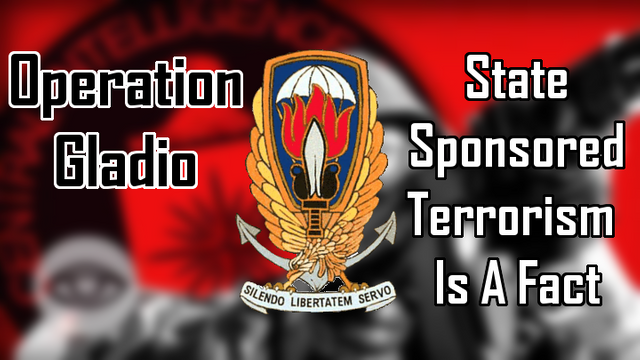
Operation Gladio was formally revealed in 1990 by the Italian Prime Minister Giulio Andreotti in an official statement to the Italian parliament. By then, Gladio had already been exposed in the courts and elsewhere, but Andreotti's 'official' revelations widely exposed the unpalatable reality. Italian investigations, into the 'Years of Lead', revealed NATO's hand in a series of terrorist atrocities that had taken place in Italy throughout the 1950s to the 1980s. These included bombings, assassinations, kidnappings and mass shootings by terrorist organisations. There is no doubt that elements within the NATO Deep State were routinely using false flag terrorism to control and manipulate public opinion and shape policy.
This is not the speculation of 'looney conspiracy theorists,' it is proven, well documented historical fact.
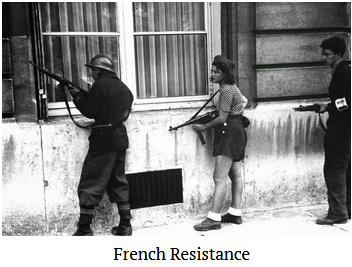
Following the end of WWII, both the U.S. and British intelligence agencies were concerned about the possible invasion of Western Europe by Soviet Russia. Building upon their experience of supporting resistance cells who fought against German occupation during the war, the U.S. Office of Strategic Services (O.S.S - the forerunner of the CIA) and the British Special Operations Executive (S.O.E - who were eventually absorbed within Britain's foreign military intelligence agency M.I.6) formed a number of clandestine military units throughout Europe.
Some of these so called 'stay behind' paramilitary units were built around resistance groups, already in existence, more so in Scandinavian countries. Elsewhere new units were created, drawing upon local assets and activists, often including far right extremists. Neither the O.S.S nor the S.O.E were averse to using neo-Nazi terrorists as operatives. Communism was perceived as the greater threat. Its state atheism threatened the Roman Catholic Church, Marxism threatened capitalism and the power of the banks and its adherence to international socialism (proletarian internationalism,) focused upon class struggle, threatened the hierarchy of the Western establishment. More than the Soviet Union itself, it was the potential spread of communist ideology which came to be seen as the primary danger. Something to be resisted at all costs.
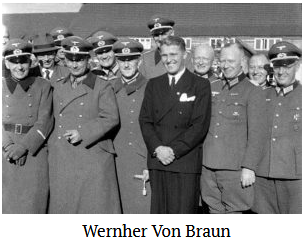
The co-option of Nazi technological and scientific expertise was enabled through Operation Paperclip. Top Nazi scientists, intelligence operatives, engineers and military strategists were either protected from prosecution or resettled in the U.S. and elsewhere. Authorised by President Truman in 1946, who stipulated that no committed National Socialists should be co-opted, the secret operation nonetheless supported many fervent Nazis. For example, Wernher Von Braun, who went on to become director of NASA's Marshall Space Flight Center, was identified as a 'potential security threat' in 1947 and was considered an enthusiastic Nazi. However, in order for him to get past Truman's restrictions, the War Department's Joint Intelligence Objectives Agency (JIOA) simply changed his file to read 'no derogatory information is available on the subject.' Approximately sixteen hundred leading Nazis emigrated to the U.S. to assist the West's cold war effort.
Operation Paperclip wasn't the only lifeline thrown to the National Socialists. The West's concern about the potential Soviet threat led them to cooperate with suspected war criminals, hard line Nazis and other radicalised groups in a variety of different ways. For example, Nazi Intelligence leader Reinhard Gehlen was supported to maintain operational control over a spy network of Nazis operating within the U.S.S.R.
Another notable recruit was Licio Gelli who was the head of the elite, neo-fascist 'Propaganda Due' (P2) masonic lodge. P2's membership was formed from leading globalists and establishment figures, including 'armed forces commanders, secret service chiefs, heads of police, generals, admirals, newspaper editors, media moguls, top business executives and bankers.' Gelli, who had been responsible for the torture and murder of hundreds of Yugoslavian partisans during the war, became a double agent for both the CIA and KGB, and was instrumental in the formation of both far right and far left terrorist organisations. A former associate and confidant of Benito Mussolini, Gelli's connections to the global power elite were staggering. For example, he was 'a close friend of Pope Paul VI, Juan Peron of Argentina, future Italian President Silvio Berlusconi and Libyan Dictator Muammar Gaddafi, in addition to many other global influencers.
While the world watched the Nuremberg Trials, which supposedly brought Nazi war criminals to 'justice,' Gelli was among those working with Western intelligence, and other powerful institutions, to facilitate the escape of Nazis considered too valuable for trial. For instance, using passports supplied by the Vatican, Gelli worked with Gehlen to establish the 'rat line ' which smuggled Nazis to the relative safety of Central and South America. Western intelligence agencies put their talents to good use. For example, Klaus Barbie (The 'butcher of Lyons,') was recruited by the 66th Detachment of the U.S. Army Counter-intelligence Corps (CIC.) From his home in Bolivia he later advised a number of governments on how to establish death squads with murderous success in Chile, Argentina, El Salvador and elsewhere.
The numerous stay behind units comprised of a mix of covert foreign intelligence operatives (spies), national intelligence agency operatives, ex military and security service personnel, volunteers and terrorists. Historians, geopolitical commentators and the official accounts came to collectively refer to the coordination of these various clandestine forces using the codename 'Operation Gladio.'
Wikipedia's entry on Gladio largely reveals the official record of the operation:
"Operating in all of NATO and even in some neutral countries such as Spain before its 1982 admission to NATO, Gladio was first coordinated by the Clandestine Committee of the Western Union (CCWU), founded in 1948. After the creation of NATO in 1949, the CCWU was integrated into the 'Clandestine Planning Committee' (CPC), founded in 1951 and overseen by the S.H.A.P.E (Supreme Headquarters Allied Powers Europe), transferred to Belgium after France's official withdrawal from the NATO military organization – but not from NATO – which was not followed by the dissolution of the French stay-behind paramilitary movements."
"The existence of these clandestine NATO units remained a closely guarded secret throughout the Cold War until 1990, when the first branch of the international network was discovered in Italy. It was code-named Gladio, the Italian word for a short double-edged sword [gladius]. While the press said that the NATO stay-behind units were 'the best-kept, and most damaging, political-military secret since World War II', the Italian government, amidst sharp public criticism, promised to close down the secret army. Italy insisted identical clandestine units had also existed in all other countries of Western Europe. This allegation proved correct and subsequent research found that in Belgium, the secret NATO unit was code-named SDRA8, in Denmark Absalon, in Germany TD BDJ, in Greece LOK, in Luxemburg Stay-Behind, in the Netherlands I&O, in Norway ROC, in Portugal Aginter Press, in Spain Red Quantum, in Switzerland P26, in Turkey Özel Harp Dairesi, In Sweden AGAG (Aktions Gruppen Arla Gryning), in France 'Plan Bleu', and in Austria OWSGV; however, the code name of the stay-behind unit in Finland remains unknown”
Consequently, in November 1990, the European Parliament published its 'Resolution on the Gladio Affair.' This single page document stated a number of known facts relating to the 40-year-long covert Operation Gladio. The European Parliament stated:
".....in certain Member States military secret services (or uncontrolled branches thereof) were involved in serious cases of terrorism and crime as evidenced by, various judicial inquiries."
"....these organizations operated and continue to operate completely outside the law since they are not subject to any parliamentary control and frequently those holding the highest government and constitutional posts are kept in the dark as to these matters."
"....various 'Gladio' organizations have at their disposal independent arsenals and military resources which give them an unknown strike potential, thereby jeopardizing the democratic structures of the countries in which they are operating or have been operating."
The resolution then recommended that European governments should:
"Protests vigorously at the assumption by certain US military personnel at SHAPE (Supreme Headquarters Allied Powers Europe) and in NATO (North Atlantic Treaty Organisation) of the right to encourage the establishment in Europe of a clandestine intelligence and operation network."
"......dismantle all clandestine military and paramilitary networks."
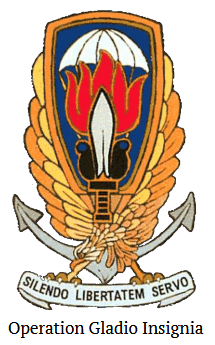
The NATO, CIA and MI6 response was muted. They partly refused to talk about it on grounds of 'national security' or 'military secrecy,' but left the Italian and European Parliamentary findings unchallenged. This is about as far as the 'official narrative' goes. The European Parliament charged its member states to route out the Gladio networks and directed NATO to shut the operation down. End of story.
However, the extent to which NATO, as an intergovernmental military alliance of independent state militaries, was ever fully in control of Gladio is debatable. Gladio's use of 'stay behind' units predated the formation of NATO in 1949. The plan was conceived by the intelligence agencies, specifically the O.S.S and S.O.E. Its practical operation was overseen by their successor organisations, the CIA and MI6. Other national intelligence agencies were involved, notably the Italian's Servizio Informazioni Difesa (SID - reconfigured in 1977) but the ability of national security services, beyond the CIA or MI6, to authorise Gladio operations remains in question.
NATO's Clandestine Planning Committee (CPC), under the auspices of S.H.A.P.E (Supreme Headquarters Allied Powers Europe), was supposedly running things. However, by 1957 the operational control of Gladio had been brought under the Allied Clandestine Committee (ACC) who were overseen by the U.S. Supreme Allied Commander in Europe, reporting directly to the Pentagon.
In 1963 that command was taken by General Lyman Lemnitzer. He remains unique as the only U.S. general to have served as Army Chief of Staff, Chairman of the Joint Chiefs of Staff and Supreme Allied Commander for NATO. It was Lemnitzer who approved Operation Northwoods proposal to use false flag attacks to provoke a U.S. military confrontation with Cuba. Whether he was a key figure in moving Gladio from a defensive to offensive operation, isn't entirely clear. NATO have repeatedly denied freedom of information requests on the subject. However, his belief in the value of 'false flag' terrorism, and the timing of his appointment, is notable.
The 'disconnect' between European states and the operational management of Gladio was highlighted by the French withdrawal from NATO in 1966. This did not coincide with the end of the French Gladio operations, called 'Plan Bleu.' This suggested the distinct possibility that not all NATO aligned governments were fully cognisant of what was going on. Another example of the lack of governmental oversight was apparent with the Portuguese Gladio operation. The CIA formed an ultra nationalistic, right wing organisation called the Aginter Press. It was run by former Vichy government operative and Nazi sympathiser Jean-Robert de Guernadec, under the assumed name of Yves Guérin-Sérac. Outwardly portrayed as a press agency, it was actually a front for the storage and shipment of arms and the training of extremist mercenaries, many of whom received instruction in covert military techniques in the School of the America's in Panama. There is no evidence that the Portuguese intelligence agency (PIDE) knew anything about the hidden agenda of Aginter Press.
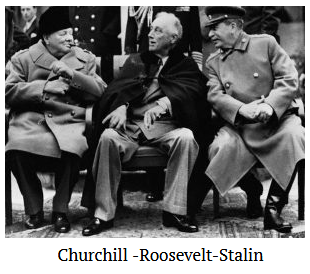
Gladio was initially created in response to a genuine belief that the Red Army would invade Western Europe. Although President Roosevelt, Prime Minister Churchill and Premier Stalin met at the Yalta Conference to agree how the post WWII world would be divided, concerns about Soviet expansionism held sway among the Western intelligence agencies.
Subsequently released documents show the fear of foreign invasion was soon eclipsed by a desire to stop the rise of domestic leftist movements. A March 1946 memorandum, for the attention of President Roosevelt, called “ Soviet Foreign Policy Towards Western Europe” stated:
"Through the national Communist Parties the Soviets apparently intend to creat[e] Leftist coalitions leading to a large measure of Communist control in national governments."
The document also outlined the Vatican's potential partnership role in opposing communism. Essentially, in central and southern Europe at least, lines of conflict were drawn between the Catholic's and neo-Nazis on the right and communists on the left. This wasn't entirely unjustified. Stalin was flooding Europe with Soviet nationals and was actively supporting and promoting the wider growth of left wing political movements throughout the continent. Nor were the Russians above exploiting the talents of former Nazis themselves. Though their approach was far less accommodating than the West's. Operation Osoaviakhim forcibly removed Nazi scientists, technicians, and even their factories and research facilities from Soviet occupied territories to Russia, where the Nazis (and others) were compelled to work on Soviet cold war projects.
Released transcripts of U.S. State Department Security Briefings, regarding Europe between spring 1947 and 1948, showed the security services were becoming increasingly concerned about the rising popularity of European communist parties, especially in Italy. They offered the opinion that the ruling moderate De Gasperi government could suffer considerable losses to the communists in the 1948 election. They warned of a possibly significant communist influence within the European political establishment.
In 1947 the U.S. National Security Act created the Central Intelligence Agency (CIA) and handed control of “espionage and counter-espionage operations abroad” to the Director of the CIA (Rear Admiral Roscoe H. Hillenkoetter.) The subsequent ' National Security Council (NSC) Directive on the Office of Special Projects' stated:
".....covert operations are understood to be all activities (except as noted herein) which are conducted or sponsored by this Government against hostile foreign states or groups or in support of friendly foreign states or groups but which are so planned and executed that any US Government responsibility for them is not evident to unauthorized person's and that if uncovered the US Government can plausibly disclaim any responsibility for them."
'Plausible deniability' remains a central tenet of covert operations to this day. The document went on to list the form these covert operations might take. This included:
"…..activities related to: propaganda, economic warfare; preventive direct action, including sabotage, anti-sabotage, demolition and evacuation measures; subversion against hostile states, including assistance to underground resistance movements, guerrillas and refugee liberation groups, and support of indigenous anti-communist elements in threatened countries of the free world."
NSC Directive 4 and 4-A added:
"The present world situation requires the immediate strengthening and coordination of all foreign information measures of the US Government designed to influence attitudes in foreign countries in a direction favorable to the attainment of its objectives Initiating and developing..... specific plans and programs designed to influence foreign opinion."
"...The Director of Central Intelligence is believed to be an appropriate and adequate action by the Council with reference to covert psychological operations abroad..."
And in enclosure 5 of the directive they clarified how these psychological warfare operation 'must' be run:
"The National Security Council.....has determined that, in the interests of world peace and U.S. national security, the foreign information activities of the U.S. Government must be supplemented by covert psychological operations."
"The similarity of operational methods involved in covert psychological and intelligence activities and the need to ensure their secrecy and obviate costly duplication renders the Central Intelligence Agency the logical agency to conduct such operations. Hence.....the National Security Council directs the Director of Central Intelligence to initiate and conduct, within the limit of available funds, covert psychological operations..."
Following the communists relatively poor showing in the 1948 Italian general election, the alarm noted in the State Department transcripts seemed somewhat misplaced, but the fear of communism persisted and defined the Cold War for the next 40 years. The exposure of Gladio revealed that 'support of indigenous anti-communist elements' practically meant the financing, equipping and training of neo-nazis, and other terrorist groups. For example, the 1978 kidnapping and assassination of Italian Prime Minister Aldo Moro and 5 of his staff; the Oktoberfest Bombing in Munich in 1980, that killed 13 and injured 211; and the series of Brabant Massacres, that took place in Belgium between 1982 and 1985, killing 28 people and injuring 40, were all linked to Gladio.
The notion presented by the European Parliament that Gladio operatives were 'involved in serious cases of terrorism' was correct but only told half the story. It neglected to mention that Gladio operatives were involved in serious cases of 'false flag' terrorism.
Considering the thousands murdered by Gladio operatives over the 40 years of its proven existence, 'why' they committed these barbarous attacks seems a secondary issue. The reality is, at some level, Western intelligence agencies and security services were involved in the orchestration of terrible crimes committed against civilians throughout Europe and beyond. There is a wealth of corroborating evidence which proves the fact beyond reasonable doubt. However, if we are to understand why some people called 'conspiracy theorists' continue to question official narratives of terrorist attacks today, it is important first to consider both the rationale that lay behind the Gladio false flag operations, and their 'psychological operation' role.
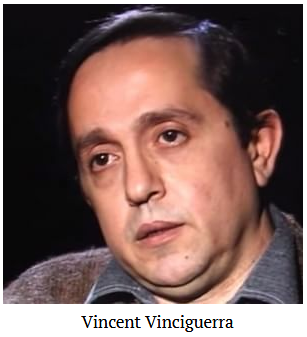
In May 1972 three Carabinieri (Italian Police Officers) were killed when a suspicious car they were investigating exploded. Known as the Peteano Bombing the far left terrorist group the Red Brigade, who Licio Gelli had helped to create, were blamed for the murders. Although no trial took place, an explosive expert Marco Morin submitted a report which stated the explosives used were the same as those previously employed by the Red Brigade terror group. This was deemed sufficient for the Italian authorities to crack down upon the Red Brigade, and other known communists. A series of raids took place, and more than 200 left wing activists were arrested.
It wasn't until 1984, when Italian Judge Felice Casson reopened the investigation into the Peteano Bombing, that the anomalies in the case became evident. Casson discovered there had been no investigation of the scene of the bombing and Morin's explosives report was a forgery. His investigation showed the explosive used was the military grade high explosive C4. He uncovered another incident in 1972 where the Carabinieri had found a weapons cache in Trieste, containing C4, which was kept quiet by the Italian authorities. This led Casson to identify a national network of hidden NATO arms, explosives and munitions stockpiles used by Gladio operatives. The C4 used at Peteano came from an arsenal concealed in Verona.
Casson ordered the arrest of Vincenzo Vinciguerra who was a member of the neo-nazi paramilitary group Ordine Nuovo (New Order). The bomb expert Marco Morin, who falsified the explosives evidence in 1972, was also a member. Vinciguerra's testimony described the Gladio network of terrorist cells, coordinated by the security services. Admitting responsibility for the Peteano bombing, he stated that he had been assisted by the Italian SID who had protected their 'asset' by smuggling him to Spain following the murders.
While it is wise to be cautious about claims made in court by criminals, Vinciguerra's statements have been corroborated by others, such as the Italian and European Parliament, and are supported by both physical and documentary evidence. He was not known to have been a senior figure within the Gladio hierarchy. However, he was apparently well-informed and his statements were consistent with both the official disclosures and the investigation of Operation Gladio by others, including the judiciary.
Contrary to Andreotti's claim, that the 127 arms caches had been decommissioned and that Gladio was not involved in the 'Years of Lead,' Vinciguerra's account seems more plausible, given the evidence. He stated that from the Piazza Fontana bombing in Milan in 1969, which killed 17 people, to the massacre of 85 people at Bologna railway station in 1980, Gladio operatives had been fully involved. These attacks were falsely blamed upon the far left but were carried out by far right Gladio units.
Vinciguerra described the purpose of the false flag attacks:
"You had to attack civilians, the people, women, children, innocent people, unknown people far removed from any political game. The reason was quite simple. They were supposed to force these people, the Italian public to turn to the State to ask for greater security. This was precisely the role of the right in Italy. It placed itself at the service of the State which created a strategy aptly called the 'Strategy of Tension' in so far as they had to get ordinary people to accept that at any moment over a period of 30 years, from 1960 to the mid eighties a State of emergency could be declared. So, people would willingly trade part of their freedom for the security of being able to walk the streets, go on trains or enter a bank. This is the political logic behind all the bombings. They remain unpunished because the state cannot condemn itself."
The 'Strategy of Tension,' described by Vinciguerra, was evidently behind the Gladio attacks from the late 1960s onwards. It seems likely the operation moved away from being a defensive counter-measure, to be used in the event of foreign occupation, to an offensive campaign, designed to manipulate public opinion, in the early 1960s. One of the released documents related to Gladio was the 1959 Servizio Infromazioni Delle Forze Armate (Armed Forces Service) report on Gladio. It clearly defined the main threat as coming from home-grown communist groups, rather than Soviet military invasion. It also suggested that Gladio operations could be used to address this problem.
Gladio units weren't only deployed in Europe. A major theatre of operation was Turkey. The Turkish stay behinds were called contra-guerilla and one of their training manuals was the 1961 U.S. Army Field Manual 31-15 'Operations Against Irregular Forces.'[25] This manual offered a diagram of the planned cell structures, including the use of terrorists cells. While supposedly referring to how an enemy may choose to organise, it is the same proposed Gladio structure given in the 1959 Armed Forces Service report. General Lemnitzer's appointment in 1963 also suggests the possibility of a change in focus in the early 60s.
A disputed and potentially damning document is the 1970 U.S. Army Field Manual 30-31b 'Stability Operations – Intelligence: Special Fields.' It was discovered when police raided Licio Gelli's house. Gelli claimed that a friend in the CIA had given it to him. While the CIA have remained largely silent on the issue of Gladio, they have been at pains to deny the authenticity of the 1970 Field Manual, alleging it a Russian forgery. This seems plausible given that some available versions, highlighted by those who doubt its origins, don't look like other field manuals which are known to be authentic.
Licio Gelli's claim, if believable, raises the question of why the CIA would pass on a forged Soviet document as their own. Perhaps this suggests the document, irrespective of its provenance, was used as if it were genuine. The Russians would certainly have held copies of genuine CIA field manuals, so why they would go to the lengths of creating a 'fake' that doesn't appear authentic is baffling. Contrary to official CIA denials, its possible authenticity was supported by the former Deputy Director of the CIA Ray S. Cline who said:
"Well, I suspect it is an authentic document. I don't doubt it. I never saw it but it’s the kind of special forces military operations that are described. On the other hand you gotta recall, that the defense department and the president don't initiate any of those orders, until there is an appropriate occasion."
Nevertheless, it is understandable why the CIA would break their customary silence on Gladio to distance themselves from Field Manual 30-31b when we read its content. The manual states:
"There may be times when HC (Host Country) Governments show passivity or indecision in the face of communist subversion and according to the interpretation of the US secret services do not react with sufficient effectiveness. Most often such situations come about when the revolutionaries temporarily renounce the use of force and thus hope to gain an advantage, as the leaders of the host country wrongly consider the situation to be secure. US army intelligence must have the means of launching special operations which will convince Host Country Governments and public opinion of the reality of the insurgent danger and of the necessity for counteraction."
"To this end, U.S. Army intelligence should seek to penetrate the insurgency by means of agents on special assignment, with the task of forming special action groups among the more radical elements of the insurgency. When the kind of situation envisaged above arises, these groups, acting under U.S. Army intelligence control, should be used to launch violent or non-violent actions according to the nature of the case."
Regardless of precisely when the 'Strategy of Tension' was first adopted, it was firmly identified as being an integral element of Gladio by Italian investigators. It refers to the use of both violent means, such as terrorism and assassinations, and non-violent, such as propaganda and economic warfare, to create a state of fear and uncertainty among the populace. The purpose being to convince the public of the 'reality of the insurgent danger.'
The objective was to foster social division, disorientate the public and foment unrest. This enabled elements within the 'Deep State' to achieve a number of objectives. These included, but weren't limited to, the manipulation of elections, providing justification for military action, the persecution of those who questioned the state (as 'unpatriotic' or 'traitors') and the creation of public demands for further state controls, as a means of 'public protection.'
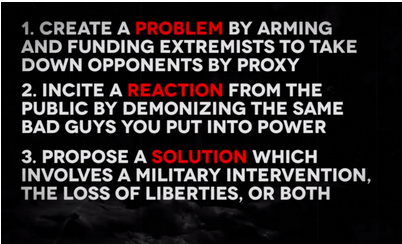
The people called 'conspiracy theorists' have come to describe this process of state manipulation as 'problem, reaction, solution.' The state creates the 'problem' then, through the use of its controlled media organisations, restricts the narrative, in order to manipulate the public's 'reaction.' This then provides the state with the opportunity to offer the 'solution' of choice. It can also be seen as the creation of 'order out of chaos,' based upon the principle of 'divide and rule.' Given what we know about Gladio, this seems like a reasonable description of how state false flag terror was used to shape public opinion in Italy during the 'Years of Lead.'
Gladio also raised another, perhaps even less comfortable, likelihood. It seems clear that elected sovereign governments did not have operational command. This suggests there was another form of government, hidden from the both the public and many within the political establishment, that was operating beyond the rule of law, without democratic oversight or control. A 'Deep State.'
Some senior establishment figures such as Andreotti, Gelli and Lemnitzer knew about Gladio, as did some terrorist extremists, like Vinciguerra, who were employed to murder civilians under its authority. However, the likely use of compartmentalisation implies only a small minority of those involved would have possessed a complete grasp of the operations' overall objectives.
It was these individuals, including many committed Nazis and neo-fascists, who had effectively formed a parallel European government, able to utilise significant state resources, without any restraint, to achieve whatever aim they saw fit. The people who were funding these activities, the public, were the last to know about it, because they were its target.
Vincenzo Vinciguerra is undoubtedly a murderous ideologue, whose actions were a vile betrayal of his Italian compatriots, no matter what he believes. He is also eloquent, with a chilling ability to explain the unimaginable succinctly. Speaking about the existence of this secret government structure he said:
"With the massacre of Peteano, and with all those that have followed, the knowledge should by now be clear that there existed a real live structure, occult and hidden, with the capacity of giving a strategic direction to the outrages... lies within the state itself...There exists in Italy a secret force parallel to the armed forces, composed of civilians and military men, in an anti-Soviet capacity that is, to organise a resistance on Italian soil against a Russian army...A secret organisation, a super-organisation with a network of communications, arms and explosives, and men trained to use them...A super-organisation which, lacking a Soviet military invasion which might not happen, took up the task, on Nato's behalf, of preventing a slip to the left in the political balance of the country. This they did, with the assistance of the official secret services and the political and military forces."
Gladio proves that state sponsored, false flag terrorism, against the host country's own population, is a matter of historical fact. The inability and frequent refusal of others to even look at the evidence, can be disheartening. Unless we recognise the reality of state terrorism, these crimes will continue. This can only lead society toward never ending conflict and oppression. Every time a possible false flag or state controlled terrorist attack occurs, such as 9/11 or 7/7, the desperation to encourage people to 'wake up' grows. However, those who consider themselves to be 'awake' should perhaps reflect upon the plethora of subjects they know nothing about, before they accuse others of ignorance.
As Donald Rumsfeld said:
"There are known knowns. These are things we know that we know. There are known unknowns. That is to say, there are things that we know we don't know. But there are also unknown unknowns. There are things we don't know we don't know."
The 1990 European Parliament 'Resolution on the Gladio Affair' asked the states involved to purge their respective Gladio infestations. Yet, to date, only Belgium, Italy and Switzerland have launched any related inquires. If the purpose of Gladio was as described by Vinciguerra, then it was a success. People across Europe were repulsed by far-left 'terrorism.' They did turn to the state for protection.
Is it reasonable to ask if the strategy of tension ended with the official exposure of Gladio? Are there any grounds to believe it continued? Can we still see evidence of its implementation today?
Neuroscientists Discover Why the Memory of Fear Is Seared Into Our Brains
Neuroscientists think they have discovered the mechanism behind the formation of fear memories in the amygdala — the emotional hub of the brain
The research was conducted by a team of neuroscientists from Tulane and Tufts universities.
Experiencing a frightening event is likely something you’ll never forget. But why does it stay with you when other kinds of occurrences become increasingly difficult to recall with the passage of time?
Norepinephrine, also known as noradrenaline, is a chemical made by some nerve cells and in the adrenal gland. It can function as both a neurotransmitter (a chemical messenger used by nerve cells) and a hormone (a chemical that travels in the blood and controls the actions of other cells or organs). Norepinephrine is released by the adrenal gland in response to stress and low blood pressure.
A team of neuroscientists from the Tulane University School of Science and Engineering and Tufts University School of Medicine has been studying the formation of fear memories in the emotional hub of the brain – the amygdala — and think they have discovered a mechanism.
In a nutshell, the scientists found that the stress neurotransmitter norepinephrine, also called noradrenaline, facilitates fear processing in the brain by stimulating a certain population of inhibitory neurons in the amygdala to generate a repetitive bursting pattern of electrical discharges. This bursting pattern of electrical activity changes the frequency of brain wave oscillation in the amygdala from a resting state to an aroused state that promotes the formation of fear memories.
Published recently in the journal Nature Communications, the research was led by Tulane cell and molecular biology professor Jeffrey Tasker, the Catherine and Hunter Pierson Chair in Neuroscience, and his PhD student Xin Fu.
Tasker used the example of experiencing an armed robbery. “If you are held up at gunpoint, your brain secretes a bunch of the stress neurotransmitter norepinephrine, akin to an adrenaline rush,” he said.

The emotional hub of the brain is the amygdala — colored in blue — and it is where fear memories are formed.
“This changes the electrical discharge pattern in specific circuits in your emotional brain, centered in the amygdala, which in turn transitions the brain to a state of heightened arousal that facilitates memory formation, fear memory, since it’s scary. This is the same process, we think, that goes awry in PTSD and makes it so you cannot forget traumatic experiences.”
Reference: “Gq neuromodulation of BLA parvalbumin interneurons induces burst firing and mediates fear-associated network and behavioral state transition in mice” by Xin Fu, Eric Teboul, Grant L. Weiss, Pantelis Antonoudiou, Chandrashekhar D. Borkar, Jonathan P. Fadok, Jamie Maguire and Jeffrey G. Tasker, 11 March 2022, Nature Communications.
DOI: 10.1038/s41467-022-28928-y
Human Melody Sustained: Karmavirus! 2







































